What it Teaches Us About Our Heritage,
What it Reveals About Liberty, and
How it Can Enrich Our Thanksgiving Holiday in 2018
A God-fearing nation, like ours, owes it to its inborn and sincere sense of moral duty to testify its devout gratitude to the All-Giver for the countless benefits it has enjoyed.
—President William H. Taft in his Thanksgiving Proclamation released on November 7, 1912—
A PDF of this article is available here.
On Saturday, November 1, 1777, the Second Continental Congress approved a declaration setting aside Thursday, December 18, 1777, as a day “for solemn thanksgiving and praise.” It was the first national Thanksgiving proclamation in the United States.
In this audio clip, the Proclamation is read by Pastor Jim McClarty.
In CONGRESS
November 1, 1777
FORASMUCH as it is the indispensable Duty of all Men to adore the superintending Providence of Almighty God; to acknowledge with Gratitude their Obligation to him for Benefits received, and to implore such farther Blessings as they stand in Need of: And it having pleased him in his abundant Mercy, not only to continue to us the innumerable Bounties of his common Providence; but also to smile upon us in the Prosecution of a just and necessary War, for the Defense and Establishment of our unalienable Rights and Liberties; particularly in that he hath been pleased, in so great a Measure, to prosper the Means used for the Support of our Troops, and to crown our Arms with most signal success:
It is therefore recommended to the legislative or executive Powers of these UNITED STATES to set apart THURSDAY, the eighteenth Day of December next, for SOLEMN THANKSGIVING and PRAISE: That at one Time and with one Voice, the good People may express the grateful Feelings of their Hearts, and consecrate themselves to the Service of their Divine Benefactor; and that, together with their sincere Acknowledgments and Offerings, they may join the penitent Confession of their manifold Sins, whereby they had forfeited every Favor; and their humble and earnest Supplication that it may please GOD through the Merits of JESUS CHRIST, mercifully to forgive and blot them out of Remembrance; That it may please him graciously to afford his Blessing on the Governments of these States respectively, and prosper the public Council of the whole: To inspire our Commanders, both by Land and Sea, and all under them, with that Wisdom and Fortitude which may render them fit Instruments, under the Providence of Almighty GOD, to secure for these United States, the greatest of all human Blessings, INDEPENDENCE and PEACE: That it may please him, to prosper the Trade and Manufactures of the People, and the Labor of the Husbandman, that our Land may yield its Increase: To take Schools and Seminaries of Education, so necessary for cultivating the Principles of true Liberty, Virtue and Piety, under his nurturing Hand; and to prosper the Means of Religion, for the promotion and enlargement of that Kingdom, which consisteth “in Righteousness, Peace and Joy in the Holy Ghost.”
And it is further recommended, That servile Labour, and such Recreation, as, though at other Times innocent, may be unbecoming the Purpose of this Appointment, be omitted on so solemn an Occasion.
Briefly, I would like to highlight eleven items relating to this proclamation and the events surrounding it. This first formal statement setting aside a day of thanksgiving in the United States is brimming with application for us today, almost 250 years later.
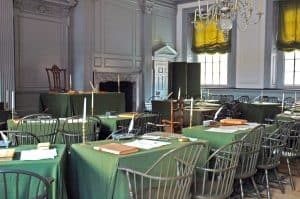
First, the Revolutionary War still was underway. Although the tide had begun to turn in favor of the Colonists, the outcome remained uncertain. It would not be until October 19, 1791—four years later—that Cornwallis would surrender to General Washington at Yorktown, Virginia.
In the thanksgiving proclamation, we see a fervent hope that God would bless the Colonial troops and grant them favor. To our forebears, it apparently was as natural as breathing to bring such concerns to God: The proclamation called on citizens to ask the Lord “to inspire our Commanders, both by Land and Sea, and all under them, with that Wisdom and Fortitude which may render them fit Instruments, under the Providence of Almighty GOD, to secure for these United States, the greatest of all human Blessings, INDEPENDENCE and PEACE.”
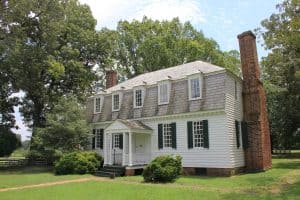
Second, the fact that our early leaders would name “INDEPENDENCE and PEACE,” specifically, “the greatest of all human Blessings,” speaks volumes regarding their priorities and character. We must learn more of this country’s early leaders, how they lived, how they conducted themselves in the world in which God placed them, and how they sacrificed to attain, establish, and maintain a culture where freedom could flourish. Beyond these things, to the degree that we can, we must reimplement their strategies for liberty today!
Third, the early leaders of the United States, and specifically here the members of the Second Continental Congress, recognized “the indispensable duty of all men [citizens] to adore the superintending providence of Almighty God; to acknowledge with gratitude their obligation to him for benefits received.” In our day, don’t we typically think of thanking God as a choice we can make and as a freedom we can exercise? It is these things; yet all too often we have failed to esteem giving thanks as a duty and obligation. Today, Christians need to rediscover their own responsibility to express gratitude to God.
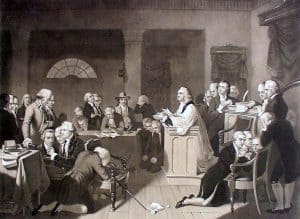
Fourth, the proclamation upholds and encourages a united, corporate expression of gratitude. It established a day “that with one heart and one voice the good people may express the grateful feelings of their hearts.” In the midst of war—gratitude. This proclamation was directed toward the country, but let’s narrow our focus just a bit. Think of what could happen in our churches today if a spirit of sincere gratitude were to grip God’s people!

Fifth, citizens were called to “consecrate themselves to the service of their divine benefactor.” The resolution rightly associates gratitude to God with accountability before Him. All too often today, Christians stop after they’ve given thanks. Perhaps the most genuine expression of thanks, however, is giving oneself to the Lord.
Sixth, the proclamation called on citizens to sincerely “join the penitent confessions of their manifold sins.” This shows us just how far America has drifted from the principles on which she was founded. Right and pure living was extolled in the early days of our nation. It even was recognized as essential to true liberty. On October 11, 1798, in a speech to the Officers of the First Brigade of the Third Division of the Militia of Massachusetts, John Adams declared,
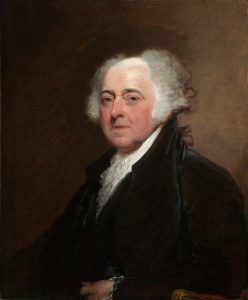
While our country remains untainted with the principles and manners which are now producing desolation in so many parts of the world; while she continues sincere, and incapable of insidious and impious policy, we shall have the strongest reason to rejoice in the local destination assigned us by Providence. But should the people of America once become capable of that deep simulation towards one another, and towards foreign nations, which assumes the language of justice and moderation while it is practising iniquity and extravagance, and displays…in the most captivating manner the charming pictures of candor, frankness, and sincerity, while it is rioting in rapine and insolence, this country will be the most miserable habitation in the World; because we have no government armed with power capable of contending with human passions unbridled by morality and religion. Avarice, ambition, revenge, or gallantry, would break the strongest cords of our Constitution as a whale goes through a net. Our Constitution was made only for a moral and religious people. It is wholly inadequate to the government of any other.
Liberty is preserved only when a people see themselves as accountable to a higher power, namely to God, and therefore keep their base instincts at bay rather than acting on them. Without the internal restraint that religion and a sense of duty to God provide, a nation can’t hire enough policemen! Yet with it, the people police themselves!
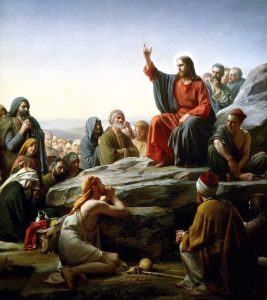
Carl Bloch, 1890
Seventh, our forebears saw the only remedy for sin as coming “through the Merits of JESUS CHRIST.” Accordingly, people were encouraged to repent of their sins and implore Him “mercifully to forgive and blot them out of remembrance.” Anyone who believes this nation wasn’t founded on the tenets of Christianity is ignorant of American history. The Thanksgiving Proclamation of 1777 is but one piece of evidence among many demonstrating that the principles of the Bible and Christianity have had a profound influence on this country.
Eighth, it is no accident that the proclamation encourages the people to ask God “to secure for these United States, the greatest of all human Blessings, INDEPENDENCE and PEACE: That it may please him, to prosper the Trade and Manufactures of the People, and the Labor of the Husbandman, that our Land may yield its Increase.” Our ancestors knew America wasn’t ancient Israel, but they also knew that “blessed is the nation whose God is the LORD” (Ps. 33:12) and that “righteousness exalts a nation, but sin is a reproach to any people (Prov. 14:34). Accordingly, they sought intentionally to obey Deuteronomy 8:18: “And you shall remember the Lord your God, for it is He who gives you power to get wealth, that He may establish His covenant which He swore to your fathers, as it is this day.”

Ninth, our founders and the early citizens of this country understood the value of a solid, unbiased education, one that upheld the principles of true knowledge, liberty, hard work, and opportunity. The Thanksgiving Proclamation encouraged citizens to pray for God “to take schools and seminaries of education, so necessary for cultivating the principles of true liberty, virtue and piety, under his nurturing hand.”
Tenth, America’s early leaders saw Christianity as a source of fulfillment, peace, and joy—as well as a force for righteousness in society, something they knew to be essential in preserving liberty. Members of the Second Continental Congress, therefore, encouraged the day of thanksgiving also to be a day when citizens would pray for the Lord “to prosper the means of religion for the promotion and enlargement of that kingdom which consisteth in righteousness, peace and joy in the Holy Ghost.”
Eleventh, the day of Thanksgiving was not to be treated causally. It would be a special, sacred day. The people were encouraged to put labor, recreation, and other activities on hold in observance of “so solemn an Occasion.”
Thanksgiving Is About More than Giving Thanks
Now, fast forward 241 years. As we approach this Thanksgiving holiday, we truly have much for which to be grateful. The Thanksgiving Proclamation of 1777 can enrich our expressions of thanks on this holiday because in it we see how gratitude is tied to so many other important things.
The Thanksgiving Proclamation of 1777 can enrich our expressions of thanks on this holiday because in it we see how gratitude is tied to so many other important things.
Today, the United States of America is in desperate need of rediscovering the principles so evident in the thanksgiving proclamation made one year after her birth. She needs to repent of her sins and embrace once more those timeless virtues and truths.
Remarkably, you can help her move in this direction this Thanksgiving by taking one simple step yourself.
Will you expand your expressions of thanks this year to touch on the items so beautifully highlighted in the Thanksgiving Proclamation of 1777?
You’ll be blessed as you do—and so will America!
Copyright © 2018 by. B. Nathaniel Sullivan. All rights reserved.
Unless otherwise indicated, Scripture passages have been taken from the New King James Version®. Copyright © 1982 by Thomas Nelson, Inc. Used by permission. All rights reserved.
top image: Frances Gunn on Unsplash
photo credit: Assembly Room, Independence Hall
photo credit: Moore House

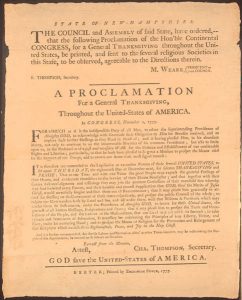

Great history lesson, and reminder of GOD’s grace.
Thank you, Ryan! I was both blessed and challenged as I wrote this post. May we as 21st-century Americans rediscover the principles that so heavily influenced the Founders of America and the nation they founded! B. Nathaniel Sullivan
It is inspiring to read and even further learn the true standing of our forefathers, going even beyond the American revolutionist, of reverence to our creator God and Savior Jesus Christ. If only we can re-spread this reverence among our young. Giving them the knowledge and truthiness of our Creator and Savior in the building of this country. What a blessing to read and learn of our heritage to create and build this country.
Thank you! As I have written on various aspects of this subject during the past few years, I continually have been amazed and inspired. We Americans do indeed have a wonderful heritage for which to be grateful. Thanks for your feedback!